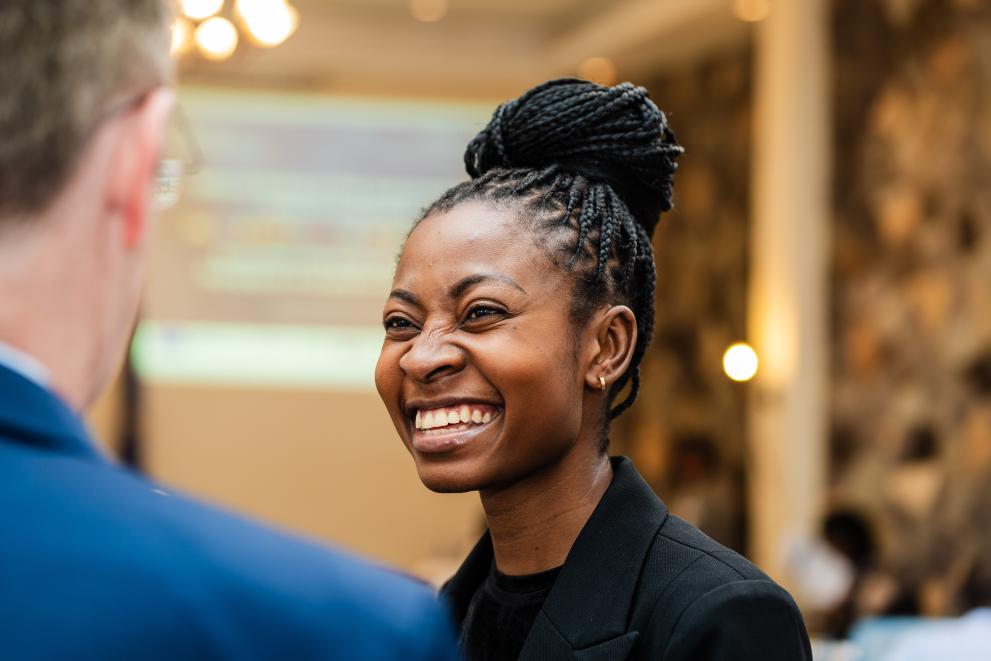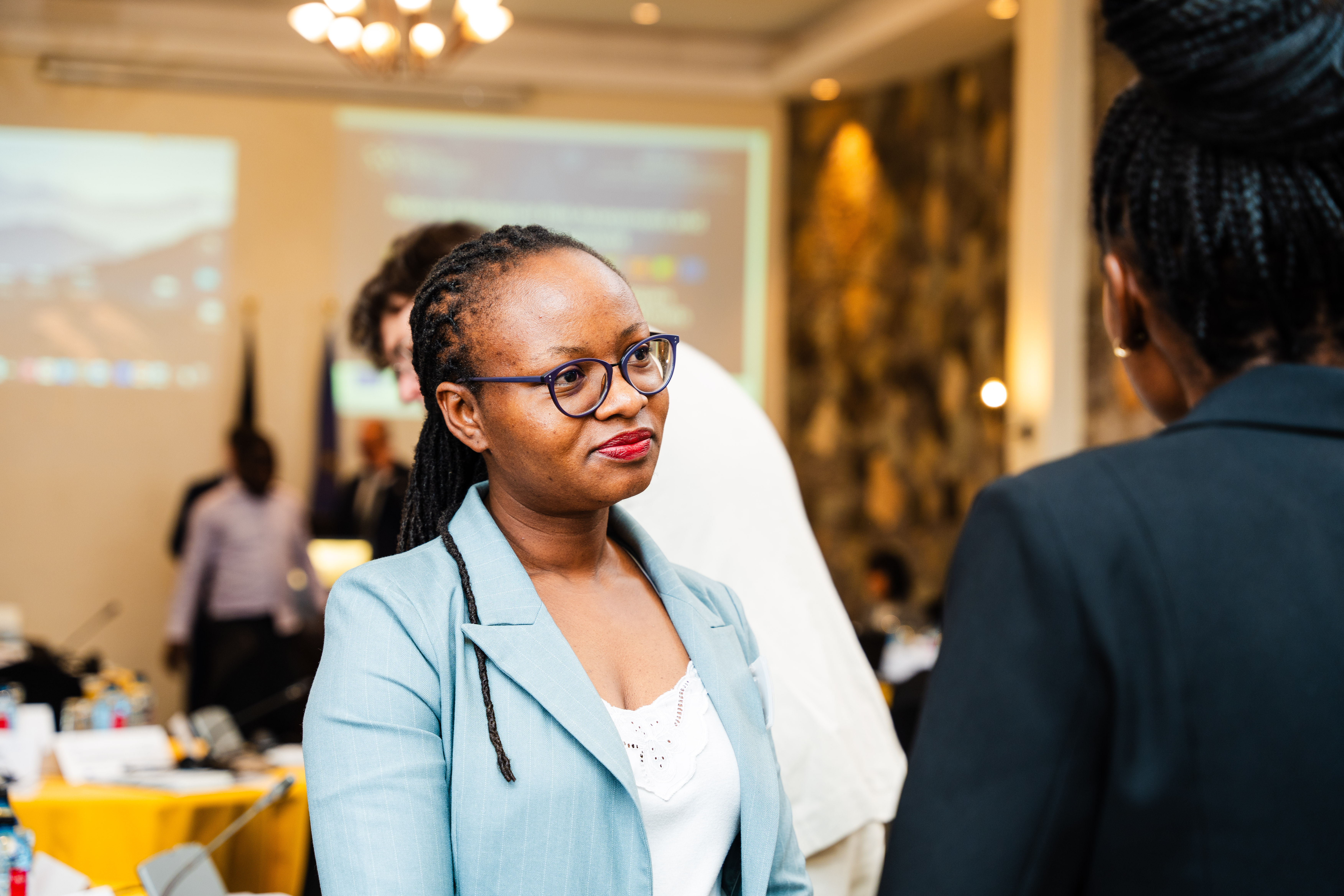
The upcoming EU CBRN CoE Newsletter will put the spotlight on Women in CBRN. Meet some of the inspiring professionals contributing to CBRN risk mitigation across the CoE network ahead of the release.
National experts Sandra Matinyi (Uganda) and Musonda Mandona (Zambia) are leading figures of their countries’ efforts to strengthen biosafety and biosecurity. With their engagement in projects like BIOCAP-ECA, they have been calling for inclusive efforts and structured approaches to mitigate biological risks effectively.
As part of BIOCAP-ECA, also known as Project 99 of the EU CBRN CoE Initiative, they share their experiences, challenges, and insights into the importance of women and youth's involvement in this crucial field.
What motivated your specific interest in biosafety and biosecurity?
Sandra Matinyi: "As an expert working in biosafety and biosecurity, I am very cognisant of some of the gaps that exist in terms of capacities. I have personally faced some challenges in finding relevant professionals back in Uganda. When looking for experts in specific domains, you would find just a handful of them. Yet, the task at hand is huge as the issue of biosafety/biosecurity encompasses every aspect of daily life, not just work done inside specialised, isolated labs."
Musonda Mandona: "I agree. What people tend to forget is that, when defining biosafety and biosecurity, almost everyone is affected. So it is crucial to raise awareness about the role individuals play, as well as how our work can impact the environment and surrounding communities.
Nevertheless, I think the challenges are still in some way surmountable. In Zambia, the problem has really been around structuring the existing programmes to bring the necessary stakeholders on board. Whilst we strive to use a One Health approach, we are still not aware of all of the different people, the right stakeholders we are supposed to have around the table."
This is why it is exciting to be part of projects like BIOCAP-ECA, because it helps us to bridge some of these gaps we face in the [Eastern and Central African] region.”

Can you explain the One Health approach and its significance?
Musonda Mandona: "The One Health approach is an approach of collaborating with all sectors affected by the issues of biosafety and biosecurity, ranging from human, animal, environmental health and really any of the other sectors involved in playing a part in biosafety and biosecurity.
Biosafety is about using science responsibly in activities such as diagnosis and research, ensuring that those involved do so in a safe and responsible manner. Biosecurity, on the other hand, focuses on ensuring that our work doesn’t negatively affect the community. This includes managing waste properly and communicating information about the materials we handle in a way that the public can understand, ensuring their protection.
It is essential to not only provide technical information for lab personnel but also to clearly communicate risks to those outside our facilities. Unfortunately, this is an area where there is still a lot of room for improvement.”
Sandra Matinyi: "Let me explain the One Health approach concretely: If your country has, let’s say, an unhealthy population due to biological risks, it will have an impact on your workforce and productivity. The economy will very much be afffected. Food security as well is a big challenge, especially in our region.
The One Health approach also looks at the malicious use that can be made of biological agents by terrorists for example. At this point, we are not even talking about a national or a regional issue anymore but a truly global impact and universal risks.
So, overall, when adopting the One Health approach, you aim to mitigate economic, food security, and national security impacts of biological threats.”
"We are leaving out a very huge portion of very key stakeholders -WOMEN- from the equation."
Why is it important to focus on women in biosafety and biosecurity?
Sandra Matinyi: "When talking about infections, diseases, it is the women who bear the biggest burden. They are the ones who end up taking care of the people who are unwell, holding the families together. So, if we do not involve them in spaces where they contribute to the decisions being made, they cannot contribute to these biosafety/biosecurity efforts. It means we are leaving out a very huge portion of very key stakeholders from the equation."
So many times, women have been left out of capacity building initiatives. It may not necessarily be by design, but in the end, the result is the same: opportunities for women are limited. When we talk about biosafety and biosecurity, the situation is even more dire. So a change needs to happen, starting with initiatives like the African Women Leadership or the BIOCAP-ECA project, which puts an emphasis on involving national experts including women."
"When talking about infections, diseases, women bear the biggest burden.”
Musonda Mandona: "I share this belief. Women’s involvement in biosafety, biosecurity -and all of the other regimes that support that kind of work- is critical because women have a unique perspective to bring to the table.
Representation, first of all, is very important. Having women in the biosaftey/biosecurity space will provide young female professionals who may be interested in getting involved in this space leading figures to look up to, and get mentorship from.
But including women is also and simply key because our countries have a lot of amazing women doing a lot of great work! Shining a light on that work is really important.”
What about the youth? How do you see their role in biosafety and biosecurity?
Musonda Mandona: "A lot of the efforts that we are making now will only be realised in a few years so it is important to have young people aware and participating in CBRN initiatives. Because, by and large, the systems we are creating are going to be for them, for a sustainable future. Young people are the ones who have to take the lead as they will be in charge of implementing these measures down the line."
A Shared Vision: a more inclusive and effective approach to managing biological threats
Both Sandra and Musonda are united in their mission to strengthen biosafety and biosecurity in their respective countries. They recognise the critical need for capacity building, legislative frameworks, and stakeholder engagement to mitigate biological risks.
They also call for a broader movement to ensure that half of the population is not left out of crucial decision-making processes.
We hope their stories can inspire others to recognise the vital contributions of women and young people in securing a safe and sustainable future for their nations and the globe.
Details
- Publication date
- 27 September 2024
- Authors
- Service for Foreign Policy Instruments | Joint Research Centre
- CBRN areas
- Bio-safety/bio-security
- First response
- Protection of material/facilities
- Public and infrastructure protection
- Public health impact mitigation
- Safety and security
- Waste management
- CBRN categories
- Chemical
- Biological
- CoE Region
- AAF - African Atlantic Façade
- ECA - Eastern and Central Africa
- NAS - North Africa and Sahel
